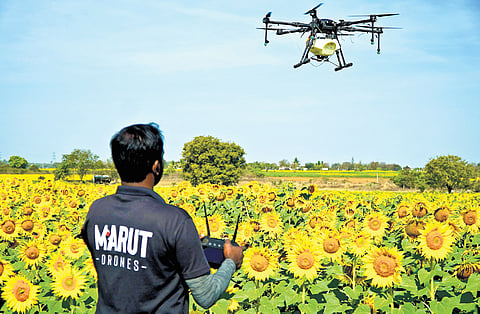

HYDERABAD: While the recent Series A funding of $6.2 million for drone tech firm Marut Drones will help it establish itself as a nationwide provider of comprehensive drone technology, the DGCA-certified company for manufacturing drones and training operators is still prioritising agricultural productivity. This apart, the Hyderabad-based firm is eyeing expansion into the defence, surveillance and disaster management sectors.
In Telangana, drones made by the firm have proven invaluable across sectors: they assist the GHMC in mosquito control for dengue and malaria prevention, aid reforestation efforts with the Forest department and provide the Hyderabad police with surveillance capabilities during major festivals.
In an interaction with TNIE, Marut Drones co-founder and CEO Prem Kumar Vislawath shares that the company is looking to leverage this amount to expand the channel and dealer network across the country. “We want to increase the accessibility and build more service centres in order to address onsite technical issues near the customers’ farms. We are also looking to improve infrastructure for manufacturing model drones with upgraded technology. Presently, we have a manufacturing capacity of 50 drones per month. We will be scaling it to 100 to 300 drones per month with a target of building 3,000 in a year,” Vislawath, who co-founded the company in 2019 along with IIT-Guwahati batchmates Sai Kumar and Suraj Peddi, says.
The firm, with a team of around 200 members, also plans to hire more senior professionals. With five drone training centres — in Maharashtra, Madhya Pradesh, Uttar Pradesh, Haryana and Andhra Pradesh — for drone pilot licencing valid for up to 10 years, Marut Drones plans to augment the number to at least 15 by March 2025, particularly in Tier-II and III cities. In Telangana, there is a centre at NIPHM, Hyderabad, and another one in Warangal. At present, the company has a fleet of 750 drones and over 1,000 drone pilots across 14 states.
“The idea to set up centres in rural areas is to reduce the expense for our customers. By setting up centres near them, we feel that we can bring more people into the sector, especially farmers who can get drone service in their villages,” explains Vislawath.
Detailing how drones help farmers, he says, “It helps in spraying [different additives] in fields with thorns or crops like sugarcane where there are snakes and mosquitoes, among others. Moreover, they can cover 20–30 acres in 10 to 12 minutes.”
To train 500 women by March
Marut drones have already imparted training in spraying pesticides and crop monitoring to 180 women from various SHGs, including 90 from Prayagraj and 60 from Motihari. The firm has an initial target of training at least 500 women by March 2025.
“Women from Karnataka and Tamil Nadu SHGs were also trained in Hyderabad this year,” Vislawath says. “Fertiliser companies like IFFCO and KRIBHCO manage them and provide work. The women from SHG groups use drones to assist farmers with spraying. Farmers pay for the fertiliser and the fertiliser companies pay the women for their services.”
Nurturing ‘village-level entrepreneurs’
Vislawath points out that their focus is not on getting farmers to buy drones, but on encouraging unemployed youth or those who have completed their education in Industrial Training Institutes (ITIs) to act as mediators or, as he calls them, village-level entrepreneurs. “Generally, we discourage farmers from buying drones and instead ask them to use the service. A majority of farmers have 5 acres of land or less. So, rather than handling it themselves, we encourage them, and also suggest at agricultural exhibitions, that unemployed youth, ITI graduates, existing tractor drivers, harvesters, or auto-rickshaw drivers take up the role. We help them purchase drones through loans and subsidies, allowing them to provide services to multiple farmers and generate revenue for themselves,” he says.
Currently, the three drone models manufactured by Marut Drones — AG365H, AG365 and AG365S — cost around `10 lakh on average and weigh around 30 kg with a payload ability of 10-15 kg. In October, the company launched a multi-featured AG365H drone at the Amravati Drone Summit in presence of AP Chief Minister N Chandrababu Naidu and Union Civil Aviation Minister Kinjarapu Rammohan Naidu. “It can also be used for feeding fish, apart from spraying and other purposes,” adds Vislawath.
Expansion to defence sector
Marut Drones has also supplied two customised high-end Octacopter drones to the National Mineral Development Corporation (NMDC) that features a coaxial design for stability and precise manoeuvrability. “These drones are designed for exploring and identifying minerals like copper, gold and lithium, as well as assessing their quality and quantity. It’s similar to how MRI and CT scans work,” Vislawath explains, adding that the firm is also working with other PSUs.
The firm is also developing first-person view (FPV) drones for defence purposes and recently gave demonstrations to the Indian defence forces in Sikkim, flying the drone at 50,000 feet. “Majorly these are used for surveillance and tactical purposes. They can operate at a speed of 25 kmph. We are trying to execute a technology called SWARM, where multiple drones can be operated with one software,” Vislawath says.